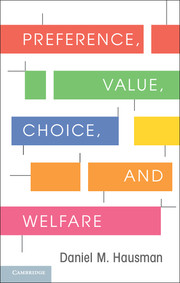1 - Preferences, Comparative Evaluations, and Reasons
Published online by Cambridge University Press: 05 June 2012
Summary
What Are Preferences?
When English-speakers talk about preferences, they do not need to use the words “prefer” or “preference.” The waiter or waitress may ask Jack, “Which would you like?” rather than “Which would you prefer?” We often ask about preferences by asking people which alternative they would choose, which they like better, or which they think would be better.
There appear to be four main concepts of preference:
Enjoyment comparisons. When I say that my dog Itzhak prefers ground beef to dry dog food, or that my mother prefers yellow roses to red ones, I am talking about what gives them more enjoyment. In this sense, an agent such as Jill prefers x to y if and only if Jill enjoys x more than she enjoys y. Let us call this an enjoyment comparison. It may compare either overall enjoyment or enjoyment in some particular regard.
Comparative evaluations. When a politician such as Margaret Thatcher expresses a preference for one policy over another, she is not reporting her enjoyment. She is talking about which policy she judges to be superior. In this sense, an agent such as Thatcher prefers x to y if and only if she judges x to be better than y in some regard. Let us call this a comparative evaluation. Comparative evaluations can be partial – implying a ranking with respect to some specific criterion – or total – implying a ranking with respect to every relevant consideration. From an ideological perspective, Thatcher might object to government provision of health care, while from a political perspective, she might favor bolstering the National Health Service. When, as in this case, an agent’s partial evaluations conflict, the agent must adjudicate among the different considerations if he or she is to construct a total ranking. Making a total comparative evaluation is more cognitively demanding than making an enjoyment comparison, and there is more room for mistakes. A total comparative evaluation takes into account every consideration the agent judges to be relevant. Unless there is a blunder in execution, total rankings determine choices. I shall argue that preferences in economics are for the most part, and should be, total comparative evaluations.
Favoring. When people say that affirmative action calls for racial preferences, they mean that it favors racial minorities – that is, it gives them a better chance to be hired by firms or admitted by universities. There is no implication that those who implement these preferences like members of these minorities better or judge them to be superior. Favoring does not imply either an enjoyment comparison or a comparative evaluation.
Choice ranking. Finally, when a waiter asks Jill whether she would prefer the soup or the salad, he wants to know simply which Jill chooses. In this sense, Jill prefers x to y if and only if when she knows she is faced with a choice between x and y, she chooses x. Call such preferences choice rankings.
- Type
- Chapter
- Information
- Preference, Value, Choice, and Welfare , pp. 1 - 10Publisher: Cambridge University PressPrint publication year: 2011



